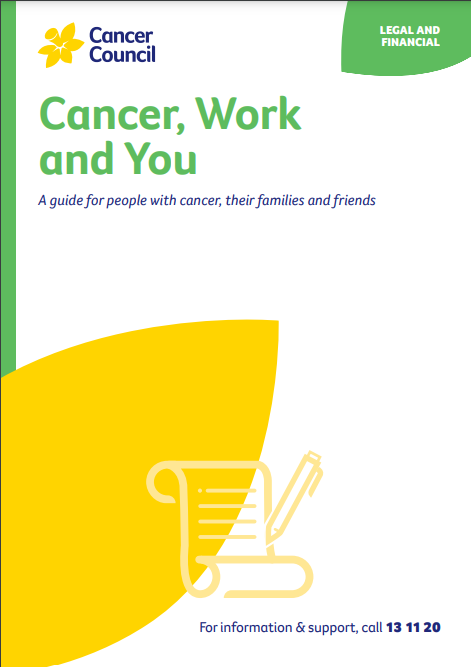- Home
- About Cancer
- Coping with a diagnosis
- Cancer, work and you
- For workers
- Making decisions about working
Making decisions about working
The many decisions you need to make after a diagnosis of cancer and during treatment can be hard. Adding decisions about work to that load can feel overwhelming. This section aims to help by giving you things to think about, and suggesting options that may be available to you.
Learn more about:
- Overview
- Reasons to work
- Work options to consider
- Working during treatment
- Making decisions about working
- Taking time off work
- Retirement
Overview
Work is an important part of many people’s lives. It can give a sense of purpose, independence and stability. For many people with cancer, the idea of giving up work can feel like another loss. Others may be happy to take time out from their career to focus on their health.
Being able to work with cancer, or while caring for someone with cancer, depends on several factors. These include:
- the symptoms of the cancer
- timing of treatment and any side effects
- workplace flexibility
- your financial situation
- what support and responsibilities you have.
Thinking about these things can help you to work out your best options. You may need or want to keep working, to take a break, or to resign or retire. If you take a break, you may return to your job, change jobs, or even look for a new career that better suits your circumstances.
Although things may seem to be happening quickly, there is usually time to look at your options and make a well-informed decision. Try to avoid feeling rushed, and get any advice you need. If you have trouble deciding what to do, you could list the reasons for and against. Or talk to family, friends or a counsellor to help work out what you want. A workplace EAP can offer career advice.
Call Cancer Council 13 11 20 to connect with someone who’s been in a similar situation. You may want to talk to your general practitioner (GP) and cancer specialists too.
Reasons to work
Some people need to keep working for financial reasons. As well as earning you a wage, work can:
- be enjoyable, stimulating and rewarding
- give you a chance to socialise and decrease your sense of isolation
- help you to maintain your sense of identity
- develop your skills, creativity and knowledge
- help you to continue to build a career or remain on your chosen pathway
- keep you active and busy (which may have a positive effect) and get you out of the house
- help you to stay in contact with friends and workmates who can offer regular support
- provide a purpose and feeling of accomplishment
- give you a sense of control at a time when cancer and treatment may make you feel that things are out of your control
- provide a routine, which can be important to some people.
→ READ MORE: Work options to consider
Podcast: Coping with a cancer diagnosis
Listen to more of our podcast for people affected by cancer
More resources
Brooke Russell, Principal Occupational Therapist, WA Cancer Occupational Therapy, WA; Bianca Alessi, 13 11 20 Consultant, Cancer Council SA; Dr Prunella Blinman, Medical Oncologist, Concord Cancer Centre, Concord Repatriation General Hospital, NSW; James Chirgwin, Physiotherapist, The Wesley Hospital, QLD; Danielle Curnoe, Consumer; Simon Gates, Barrister, Tasmanian Bar, TAS; Justin Hargreaves, Medical Oncology Nurse Practitioner, Bendigo Health Cancer Centre, VIC; Kaylene Jacques, Director, People and Communications, Cancer Council NSW; Alex Kelly, Senior People Attraction Advisor, Human Resources, Allianz Australia Insurance, NSW; Legal reviewer; Georgina Lohse, Social Worker, GV Health, VIC; Lesley McQuire, Consumer, Cancer Voices NSW.
View the Cancer Council NSW editorial policy.
View all publications or call 13 11 20 for free printed copies.
Need to talk?
Support services
Coping with cancer?
Speak to a health professional or to someone who has been there, or find a support group or forum
Need legal and financial assistance?
Pro bono services, financial and legal assistance, and no interest loans
Cancer information
What is cancer?
How cancer starts and spreads
Dealing with the diagnosis
Common reactions to a cancer diagnosis and how to find hope

